Shellfish and their calcium carbonate shells have taken the spotlight during the ocean acidification discussion. We know that other animals in the ocean will be affected, but we’ve only just begin looking beyond shells and skeletons. Biologists have started to look at the behavior of fish in lower pH conditions – with surprising results.
If you put a fish in acidifying water, you’re likely to see quite a drastic change in behavior. That is not really a surprise. What is surprising is how different fish are behaving under the lower pH levels predicted for the year 2050. Two studies looking at fish behavior in response to ocean acidification has us a bit confused and definitely curious about the implications. The studies – one on rockfish and the other on clownfish – have yielded contradictory and puzzling results. Clownfish, a famous crowd favorite, are showing a unusual lack of fear for predators. Rockfish, a yummy but lesser-known group of creatures, have demonstrated a heightened state of anxiety. These results have us all scrambling to understand what the future might hold for the world’s fisheries.
The clownfish
If you’ve ever seen the animated film Finding Nemo, you might have a soft spot in your heart for clownfish. The bright orange and white striped anemone fish are usually described as cute and playful . It’s a true pleasure to see their colorful bodies popping in and out of waving anemone tentacles when snorkeling or diving. They are perhaps the most well known of all the reef fish, as Disney/Pixar had many of us rooting for the reunion of Marlin and Nemo. Since they are such a mainstay for ecotourism, it’s important to understand how clownfish will respond to acidifying waters.
When we are snorkeling, the marine environment simply sounds like splashing water to us. But fish have to listen much more carefully – a noisy reef might sound like a predator feeding. It’s a smart move on the fish’s part to stay away from such noise and avoid being eaten. Biologists wanted to see if fish would still evade scary sounds when exposed to water with a lower pH.
They accomplished this by putting together a tank with an underwater speaker at one end playing the sounds of a noisy reef. Then they placed clownfish in the tank to observe them under normal ocean conditions and under a lower pH. Clownfish in ordinary sea water did the smart thing and swam away from the sounds. When the biologists lowered the pH of the water to the level predicted for our oceans in 2050, the clownfish did something quite strange. They did not swim away from the sounds; rather they swam back and forth, as if there were no sounds of a hungry predator nearby.If all clownfish were affected this way we can expect a decline in the species to happen fairly quickly.
Another study revealed that juvenile clownfish raised in lower pH conditions lost their sense of smell – they no longer responded to any olfactory cues. Smell plays a big role in settlement, foraging and avoiding predators. If they all lose their sense of smell, our favorite little fish may soon only exist as an animation.
The rockfish
On the other end of the spectrum are the drab rockfish, found in the cold waters off the west coast of the United States. There are 102 species of rockfish, none of which receive the same glory as their tropical clownfish cousins. Rockfish are characterized by spiny fins and neutral-colored striations and speckles on their scales. Anemonefish like to live in anemones while rockfish like to live in…well, rocks. The clownfish is certainly pretty to look at, but they don’t make a very good meal. A pan-seared rockfish with lemon, on the other hand, is an exquisite dinner.
The study in question took juvenile rockfish and exposed them to the same lower pH water predicted for 2050. Then the fish were placed in a tank that had one dark side and one lighter side. The control rockfish (not exposed to a lower pH) just swam back and forth and spent an even amount of time in all areas of the tank.
The fish exposed to lower pH levels, however, stuck to the dark side of the tank. This is the same behavior shown by fish that have been given an artificial anxiety-inducing drug. The conclusion: lower pH makes rockfish more anxious. This is almost the complete opposite of the clownfish, who were not nearly anxious enough. When the acid-stressed fish were placed back in regular seawater, it took a full 12 days until they started to act like normal again.
If rockfish become nervous under lower pH levels, it could have odd implications. They might spend less time foraging, searching for new habitat, looking for mates – they’ll essentially become the agoraphobics of the sea, afraid of the great wild ocean and forever sticking to their rocky caves. It would certainly make them harder for fishermen to catch.
Which path will other fish go down?
Biologists, fishermen and consumers are all wondering the same thing: how might a lower pH in ocean water influence and change other fish species? It is curious to imagine which fish might follow the care-free and unknowingly suicidal path of the clownfish, and which might exhibit the anxiety-driven actions of the nervous rockfish. On a grand scale, entire fisheries could change. Many species would likely become harder to catch, some easier. Perhaps some populations might even be wiped out forever, either because they’ll make easy prey or because they lack the courage to mate and reproduce.
It is very possible, quite likely actually, that other fish will be affected in ways we don’t yet understand. Really, all these two studies clearly tell us is that a lower pH in ocean water is going to make fish change. We haven’t yet studied what happens to fish eggs or juvenile stages. As fish bodies attempt to adapt to a changing ocean, there may be other consequences that could reshape the ocean’s ecosystems. Some fish will be more likely to survive and adapt than others. Emerging science will tell us more, but until then we have plenty to chew on while we contemplate the complexities of the future. In the meantime, check out ways you can reduce your carbon footprint, lessening the impacts of ocean acidification. At Pucci Foods, we’re always considering the future of our oceans and what we may do now to help. Contact us to learn more.


